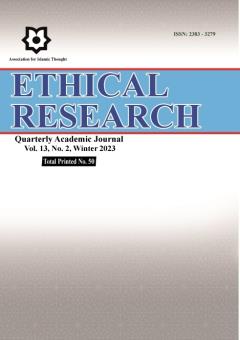Analytical and comparative research on types of freedom from the perspective of Islam and the West
Subject Areas : اخلاق و تربیت اسلامی
mohammad sharifani
1
![]() ,
Mohammad marefat
2
*
,
Mohammad marefat
2
*
![]()
1 -
2 - yes
Keywords: Freedom, types of freedom, legitimate freedom, limited freedom.,
Abstract :
In this article, with descriptive and analytical methods and with the help of written documents, the types of freedom from the perspective of Islam and the West have been investigated and analyzed in order to increase the effectiveness and growth of moral productivity. From the point of view of Islam, freedom is a means to achieve goals and it is different from the concept of laziness and laziness, which are considered morally reprehensible traits. Freedom in the social system, especially the religious society, has important benefits and effects by respecting its limits and boundaries. In order to achieve such an ideal, the types of freedom from the point of view of Islam must be carefully analyzed and examined. The question of the current research is, according to Islamic teachings, what are the types of freedom? What is the difference between the views of Islam and the West on the issue of freedom? What are illegitimate and unreasonable freedoms? In this article, it became clear that there are various types and definitions of freedom, each of which is concerned with its dimensions. Since man is a social being, he cannot have absolute freedom; Therefore, freedom will always be limited by limitations and conditions, and reason, revelation and law are its general limits. The religion of Islam accepts and emphasizes freedom of thought, expression, and politics with the considerations that are based on agreement with the fundamentals of religion, while separating freedom of thought from freedom of belief, and emphasizing freedom of thought and freedom from inquisition, freedom of belief. does not accept.
قرآن کریم، ترجمه علی مشکینی، قم، الهادى، 1381ش.
ـــــــــ، ترجمه ناصر مکارم شیرازی، تهران، دفتر مطالعات تاريخ و معارف اسلامي، ۱۳۸۰ش.
نهج البلاغه، تحقیق: صالح، صبحی، قم، هجرت، 1414ق.
ایازی، محمدعلی، آزادی در قرآن، تهران، ذکر، 1395ش.
برلین، آیزایا، آزادی و خیانت به آزادی، ترجمه عزتالله فولادوند، تهران، ماهی، ۱۳۸۶ش.
ــــــــــ، چهار مقاله درباره آزادی، ترجمه محمدعلی موحد، تهران، خوارزمی، 1380ش.
التمیمی الآمِدی، عبدالواحد، غرر الحكم و درر الكلم، قم، دفتر تبلیغات اسلامی حوزه علمیه قم، 1366ش.
الحرانی، الحسن بن شعبة، تحف العقول عن آل الرسول(ص)، قم، جامعه مدرسين حوزه علمیه قم، 1404ق.
دهخدا، علیاکبر، لغتنامه دهـخدا، تهران، دانشگاه تهران، 1377ش.
ربانی گلپایگانی، علی، دین و آزادی، کلام اسلامی، شماره 32، ص 36-53، زمستان ۱۳۷۸ش.
رجبی، محمود، انسان شناسی، قم، مؤسسه آموزشی پژوهشی امام خمینی(ره)، 1394ش.
سبحانی تبریزی، جعفر، آزادی و دین سالاری، قم، مؤسسه امام صادق(ع)، ۱۳۸۴ش.
ــــــــــــــــــ، آزادی مطلق یا آزادی محدود، کلام اسلامی، شماره 43، ص 4-13، پاییز 1381ش.
صدوق، محمد بن علی بن بابويه، الخصال، تحقیق: غفارى، علیاكبر، قم، جامعه مدرسين حوزه علميه قم، 1362ش.
ـــــــــــــــــــــــــــ، من لايحضره الفقيه، تحقیق: غفارى، علیاكبر، قم، جامعه مدرسين حوزه علميه قم، 1413ق.
طباطبايى، سیدمحمدحسين، اصول فلسفه و روش رئالیسم، تهران، صدرا، 1374ش.
طباطبایی مؤتمنی، منوچهر، آزادیهای عمومی و حقوق بشر، تهران، دانشگاه تهران، ۱۳۷۰ش.
عمید، حسن، فرهنگ لغت عمید، تهران، امیرکبیر، 1381ش.
قاضی شریعتپناهی، سید ابوالفضل، حقوق اساسی و نهادهای سیاسی، تهران، میزان، 1395ش.
كلينی، محمد بن یعقوب، الكافي، تهران، دار الكتب الإسلاميه، 1365ش.
کوهن، کارل، دموکـراسـی، ترجمه فریبرز مجیدی، تهران، خوارزمی، بیتا.
المجلسی، محمدباقر، بحار الأنوار الجامعة لدرر أخبار الأئمة الأطهار(ع)، بيروت، دار إحياء التراث العربي، 1403ق.
مخلصی، عباس، عقلانیت دین در قرائت شهید مطهری(ره)، اندیشه حوزه، سال هفتم، شماره 97، ص 59-74، فروردین و اردیبهشت 1379ش.
مطهری، مرتضی، مجموعه آثار، قم، صدرا، 1377ش.
معین، محمد، فرهنگ فارسی معین، تهران، امیرکبیر، 1363ش.
منتظر قائم، مهدی، آزادی سیاسی، حکومت اسلامی، سال دوم، شماره 1، ص 100-128، بهار 1376ش.
یزدی، حسین، آزادی از نگاه استاد شهید آیة الله مطهری(ره)، قم، صدرا، 1391ش.

